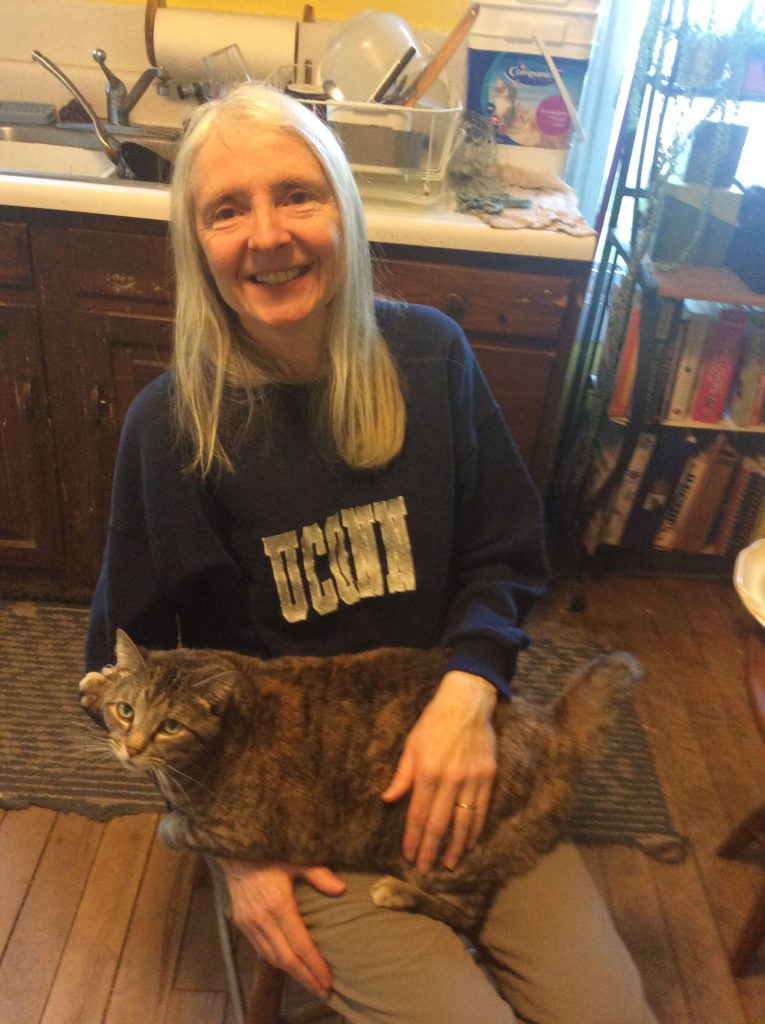We have two cats, Garfield and Elphaba. They were a package deal, brought into our household by our daughter Charissa while Cindy and I were spending a year hiking across the country. When Charissa moved out everyone thought it best for the cats to stay, particularly for the company they give Cindy.
In this blog Garfield has been getting all the attention. That fits his personality as a rather needy cat. Elphaba blends into the background more but is no less affectionate, as this photo with Cindy reveals. As this photo relates to two important caregiving topics I figure I would use it to also introduce Elphaba to the world, in what might be interpreted as a “stream of consciousness post.”
The photo was taken at breakfast time. Usually, we both eat standing up for this and most meals. Our family as a whole has a strange custom of eating our meals while standing in the kitchen and feeding Cindy is just easier this way. Cindy is sitting in the photo because she started to feel dizzy, to the point of almost feinting.
The first occurrence of this happened last August. In that case we were away from home, not following our usual routine; I thought that the cause was low blood sugar from a delayed breakfast. Such dizziness has occurred a handful of times since then, always in the morning, but sometimes after Cindy has eaten and I knew low blood sugar was not the likely cause.
I touched base with our primary care practitioner Patty on this and she suggested that dehydration might be the cause. This diagnosis seemed to be confirmed when Cindy nearly feinted two mornings in a row, this photo with Elpahaba representing one of those mornings. When something like this starts to happen regularly it is either cause for grave concern or provides the data needed to remedy things. Fortunately, the latter was the case.
Cindy was hydrating as much as usual, but there was a correlating factor. The previous night to both mornings Cindy had alcohol, which can be a diuretic. Cindy has not had alcohol since; she has not had a dizzy spell since. There’s also another lesson here besides avoiding dehydration.
Topics come in waves on my Google Alerts for Alzheimer’s and brain health. Occasionally the wave corresponds to something deemed healthy for the brain … but with important caveats left out. The benefits of red wine for brain health is one such topic.
Red wine has flavonols, powerful antioxidants that indeed are great for brain health, as well as other afflictions (since free radicals and oxidative stress are bad for a variety of things). Yet red wine also has alcohol, which has both costs and benefits.
If you lead a stressful life but can moderate your intake of red wine, that is probably just as healthy for you as eating blueberries, if not more so. You not only are getting antioxidants but, in essence, a relaxant in the bargain. Yet if you are not the least bit stressed red wine can offer you nothing that something like blueberries also can provide without any side effects to you, like dehydration. Red wine is not the miracle cure-all some headlines might lead you to believe (blueberries come close to that, if you don’t mind dark poop 🙂 ).
I see this often in the headlines I read from Google Alerts. After all, the point of many press releases that generate these reverberating headlines is to sell you stuff. Yes, coconut oil is great … if ketones happen to be what you are lacking in your diet. Yes, red wine is great … if the benefits outweigh the costs for that choice of flavonols. You won’t see these caveats added to the headlines and press releases in our mass media world; I encourage you to be mindful of them on your own.
I will drink red wine in moderation when I am on my own. However, there is one more “stream of consciousness” point to make. While red wine has the added benefit of alleviating stress, you are better off simply not leading a stressful life. This is the recommended approach to any affliction, including Alzheimer’s, in a nutshell. As individuals and as a society we can embark on the relentless pursuits of cures to the lifestyles we lead; or we can lead lifestyles that will help prevent these afflictions in the first place.

